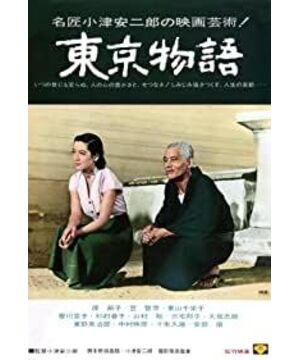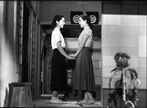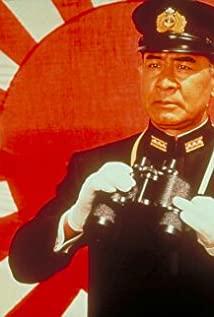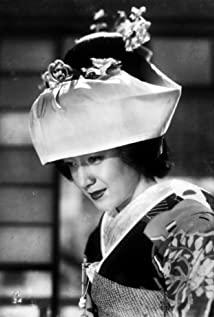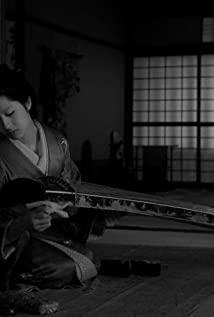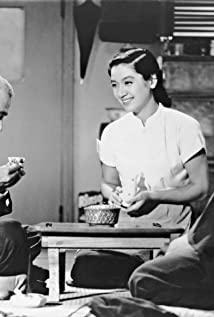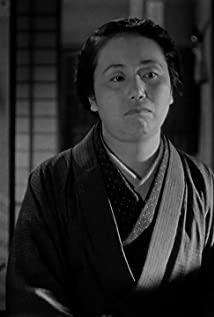Ozu film suitable for savoring, after repeated chewing, exudes a charming fragrance. In the simple and orderly interior space, the family gathering and scattering, joy and sorrow are expressed. Except for the first work "Knife of Confession", which was a costume film, Ozu basically worked silently in the modern family drama he was familiar with. After World War II, his style began to mature. "Late Spring" is undoubtedly a landmark work. From the melancholy critical realism of "Hen in the Wind", Ozu began to run a unique and unique work. Timeless ethical affection. The restaurant called "Wakamatsu", the tavern of "luna", the father of "Hirayama", the daughter of "Kiko", and the son of "Koichi" constantly appear in Ozu's images. Japanese-style furniture and corridors that seem to be familiar , Tiantai is in the same continuous line, all of which together form a refined and perfect family concept. The actors in Ozu's movies are always the same. The appearance of Tomomi Kasaki, Setsuko Hara and others time after time, just to make Ozu's images more coherent, and also to improve Ozu's family philosophy. Repeated scenes, constantly discussed topics (marriage, children, husband and wife, and between two generations, etc.) reflect the sad and happy lives of ordinary people from one aspect or another, and also reflect a state similar to life. In the repetition and gradual change, a sense of relief for life is revealed. The nostalgia for the past, the panic for the future, that bitterness, finally turned into a kind of Enron that had to be accepted.
For Ozu's image content, he has a unique set of forms, a slightly elevated position, golden section setting and composition, surrealist black and white contrast, etc., which together construct Ozu's world-famous image aesthetics. Sato Tadao once said that Ozu seems not interested in the montage theory of Eisenstein and Pudovkin, but is obsessed with his unique way of violating the existing grammar of the film. Calm and long-shot transitions and unique empty-shot transitions. Time glided by fingertips, quietly flowing, but the faint narrative progress contained a calm artistic conception. The soft violin soundtrack and the soothing chorus of primary school students are full of irreparable sadness. Without Hollywood-style external conflicts and dramatic actions, Ozu's films appear pure and natural. At the Japanese director's banquet in 1963, the drunk Ozu said that the movie was "just a prostitute who stands on a bridge and pulls customers in straw bags" to him. It can be seen that Ozu is actually shooting movies with a very self-esteem and depressive mentality. He is a director who pays attention to taste, and this is the main reason that makes him such a formatted image style. The characters in the movie are courteous, restrained in form, and keep a certain distance in humility, so that we can not only go deep into the plot, but not completely indulge in it. The characters in Ozu's movies always talk to the camera, without strenuous exercise, but showing the original ecology of life in their gestures and smiles. They talk about it, and interpret a different kind of excitement.
1. Social Upheaval and Family Division
Ozu’s era coincided with the rapid changes in Japanese society, the economic crisis, the Second World War, and even the depression and recovery after the war. As the smallest unit of society, the family naturally inevitably undergoes the baptism of the times. This resulted in unprecedented changes. Traditional ideas have been challenged and questioned like never before. Especially after World War II, as a defeated country, the influx of Western things in Japan has further promoted the disintegration of traditional Japanese families. What Ozu's movie reflects is exactly the family changes during this period. He described the situation in Japan in a nuanced manner, stubbornly confining his vision to activities between family members and friends, and refusing to extend it more broadly. His films have no fierce contradictions, no unforgivable ugliness, and under a relatively ideal state, they interpret a fascinating ordinary life. Ozu refuses to criticize and comment, watching the activities of the characters silently, which just allows his works to transcend the current era, like a mellow wine. His works are simple and simple because of their simplicity, and because they are objective and graceful. Of course, this is not to say that Ozu’s films lack the contemporary character. After all, everyone cannot escape the prison of the times, or it is the uniqueness of the times that makes the content and form of Ozu’s films perfect. Since then, basically no one can imitate Ozu. , Even if you can learn its form, it will become rigid because it can't get its charm. As Wenders said, the Tokyo where Ozu was located no longer exists, so the format Ozu used to record that period may no longer be applicable.
The disparity between the rich and the poor and the inequality of status brought about by the drastic social changes are obvious, "I was born, but. The two children in "couldn't figure out why their father raised his hand to the father of a classmate, and the stalwart image of their father gradually disintegrated in their minds. The adults have nothing to do with the time. In the eyes of adults, all this is very realistic, because the classmate's father is his boss, so it must be so. As "I was born, but. The reprint of "Good Morning" continues to discuss the children's doubts about why everyone has to nodded and talked about the weather when they meet. In the eyes of children, all this is meaningless. And the TV that the children are keen to watch, but their father is dismissed as a fool-making machine, so the children refused to talk, which caused a lot of jokes, Ozu used a kind of indifferent humor to discuss a serious topic. In the meantime, it was a helplessness that was difficult to suppress. The two films finally ended in a compromise by the adults, "I was born, but. In "", the parents tried their best to get the children back to the dining table, and in "Good Morning" the TV finally entered their family. In the process of social change, what Ozu describes is an awkward state, doubts about the past and traditions, as well as helplessness and final compromise with the future, which symbolizes that children in the future are always winners. This is in "Mai Qiu" The same is true in China. When the children ran away from home because their father did not buy toy train tracks for them, the whole family was in a mess. When the children were retrieved, the father was helplessly relieved.
The disintegration of the traditional family system, the loss of father’s authority, and a series of changes followed. From the very beginning of "Brothers and Sisters of the Toda Family", the father of the head of the family was killed. As a result, the patriarchy disappeared, leaving a pile of debts and debts. The helpless mother, little daughter, and children refused to support their mother, and eventually the mother and daughter had to live in the abandoned villa of the Totian family. Since then, in Ozu’s movies, the father often appeared, but he has become a lonely old man, whether it is the parents who expressed helpless decision to their daughter in "Mai Qiu" or the ones ignored by the children in "Tokyo Story" For the elderly, the cohesion of the family has disappeared with the development of society. In "Tokyo Story", Hirayama sighed helplessly, "The times are changing, and we have to face it."
In fact, Ozu is an extremely contradictory person. On the one hand, he refuses the drastic changes and is obsessed with the beauty of tradition. On the other hand, he takes all these changes for granted and passively accepts them. This kind of contradiction is most obvious in Ozu’s image hollow lens. In addition to expressing the dynamics of time and promoting the development of events, his empty lens often shows up two completely different things, the quaint and solemn buildings in Kyoto and the chimneys of factories. Each side is interesting, and the train that goes away is like an irresistible wheel of the times, leaving with loss. The contrast in "Late Spring" is the strongest. From the beginning of the tea ceremony at Yuankaku Temple to the wonderful and charming Noh performance in the middle, it shows the traditional beauty. At the same time, on the half-old and not new streets of Tokyo, there are often English billboards, and even the American baseball movie star Gary Cooper, whom Kiko and friends often mentioned, or the baseball played by the most westernized children. The competition, however, highlights Japan's increasingly lost tradition. There is a scene worth noting in the film. When Kiko and Ono are riding a car together in the suburbs, on the peaceful countryside road, the foreground is a Coca-Cola billboard. This cannot but be said to be a great irony.
"Sister Zongfang" also has this kind of helplessness. In the film, the younger sister in modern clothes and the older sister in traditional kimono can be said to be a sharp contrast. The younger sister encourages her to leave her husband and reconcile with her old lover, but the older sister upholds the tradition. Women are not willing to leapfrog one step further. Perhaps what this contradiction reflects is Ozu's contradiction. In "Tokyo Twilight", the sister who was married according to his father's arrangement had no choice but to return with her child, while the sister who pursued freedom unexpectedly got pregnant and had an abortion, and eventually died under the wheel. Ozu seemed to be full of loss and doubts about the tradition and the future, and he refused. The change is just like when he strongly opposed the sound film at the beginning, but at the same time, he had to face the impact of this change on people.
2. Family and love
Ozu is a traditional person, and the scenes of father and son in "When Father Was Alive" or "Floating Grass" enjoying the merriment between father and son, fishing in the stream, may be the father and son he yearns for. The second son of the old man in "Brothers and Sisters of the Toda Family" may be a portrayal of Ozu himself. He justly rebuked his brother and sisters for their unfilial piety to his mother, but when his sister introduced him to him, he became shy and reluctantly. Accepted, and then fled through the back door. In terms of love expectations, the man’s shyness and the woman’s initiative may be the portrayal and expectation of Ozu himself, which is similarly manifested in "Late Spring." In terms of marriage, "The Taste of Tea and Rice" should be Ozu's ideal marriage model. At the end of the film, the husband is preparing to go abroad due to official duties, but the wife is angry with her husband and missed the time to see her husband, feeling alone. In the middle of the night, the plane malfunctioned and the husband turned back. The husband and wife were able to reconcile, and the two shared a simple and warm meal with tea and rice. The husband and wife respect each other and love each other, even if the tea and rice are so sweet.
In Ozu's later films, the daughter's marriage has always been a major topic, and the love between father and daughter derived from this often makes people tearful. In Sato Tadao's view, Ozu's images are clearly influenced by early American film images. For example, his "Floating Grass" was actually inspired by George Fitzmorris' "The Man Who Attracted the Audience", "The Brothers and Sisters of the Toda Family." It is a reprint of the American movie "Over the Mountain". However, the expression of Ozu’s films has gradually shifted from Western-style father-son affection to father-daughter affection that conforms to Japanese characteristics. "Late Spring" should be a more obvious turning point in Ozu's images. The re-joining with Takao Noda and the appearance of Hara Setsuko gave Ozu's movies an unprecedented charm and laid the tone for Ozu's later images. In "Late Spring", the daughter Kiko, played by Setsuko Hara, is over marriageable age. His father and aunt are very anxious about this and look for a suitable candidate for her. In fact, the father is not willing to marry his daughter, and the daughter is satisfied with it. Kind of taking care of his father’s life, at the back of the film, Kiko said tearfully to his father: "I just want to be by your side. I love you very much. Being with you is my greatest happiness." "I know very well that marriage is also Can't give me much happiness". But the father immediately replied: "This (marriage) is an order of life and human history." Raising daughters and then sending them to marry seems to be something that the father has to do. The father sighed against Professor Beichuan’s wife: “It doesn’t make much sense to have daughters. You raise them and send them to marry. If they are still single, you will worry. If they are still not married, you will be disappointed. "This kind of sigh has always appeared in later films. The father in "The Taste of Saury" also said similar words after sending his daughter away, and his friend immediately retorted, "Boys and girls are not the same. In the end, Will leave, leaving only the elderly.” This may be the best reason to explain Ozu’s lifelong unmarried life. Tadao Sato partly attributed the reason to Ozu’s shyness. Some people even think that Ozu is gay because he was in middle school. , Ozu Zeng was expelled from the dormitory by the school because he wrote a "frivolous" letter to the lower grades. However, in the days to come, there is no sign that he has a homosexual tendency. On the contrary, his images repeatedly show that his daughter is married, leaving behind the sadness of his father, or this is what Ozu who treats his mother's filial piety cannot face and does not want to see. ending.
In fact, Ozu’s description of love and marriage is often imperfect, or rather flawed, just like Ono, who Kiko likes in "Late Spring," but is already engaged to someone else, who Kiko likes in "Mai Qiu" , But it was the widower Kenji with a 3-year-old child, all of which surprised people. Without the Hollywood courage to break through taboos, the characters in Ozu's movies often cling to a rare ethics and morality. However, there has also begun to appear a kind of change, that is, dissatisfaction and rebellion against parents arranged marriage. In "Mai Qiu", Kiko gave up the middle-aged president whom everyone was optimistic about, and married the widower Kenji on his own terms. The daughter in "The Flower of the Other Side" is also obsessed with the love she pursues. The father was very upset because of this, and this reflected the conflict between traditional ideas and realistic ideas. In "The Flower of the Other Side", the father was open to others, but could not let go of his own daughter. The contradiction in this was Ozu's hesitation. Mentality. This was alleviated by "The Taste of Saury". The father first sought out the person his daughter loved. However, the hope was not fulfilled. After all, the father’s procrastination and perseverance caused the daughter and the loved one to miss. Married, but not without regrets. This is Ozu's view of the world. Perhaps life itself is not perfect.
3. The loneliness that I have to get used to
"Spring has arrived in the valley, and cherry blossoms bloom like clouds; but here, the stagnant eyes, the taste of saury-the flowers are also melancholy, and the taste of sake has become bitter." During "The Taste of Saury", Ozu's mother left her hands. This is a passage in Ozu's diary, so sad and so lonely. Shan Piao in "The Taste of Saury" said tragically, "In the end, everyone is always alone, alone." For Ozu, who has never been married all his life, loneliness may follow him. As the second daughter-in-law Kiko in "Tokyo Story" said: "The day passes and the night comes. But nothing happened, I feel a little lonely, my heart seems to be waiting for something...". Ozu’s movies are never short of open jokes. The ridicule in the "Wakamatsu" restaurant and the jokes when old friends meet are infinitely interesting, but infinitely sad. There is quite a feeling of youth no longer. There is one in it. The scene is worth noting, that is the gathering of old friends and classmates. In "Tokyo Story", Hirayama came to Tokyo and visited the old friend Hattori and others. The three of them drank in the hotel and revealed their dissatisfaction and helplessness with their children. This reflects the loneliness and sadness of the late old man.
The loneliness of "Tokyo Story" is easy to empathize. During a trip to Tokyo, Hirayama and his wife witnessed the indifferent and disintegrating family relationship. The children worked hard for their own careers, and had no time to take care of the visiting parents. In the son's home, A scheduled trip was originally cancelled due to an optional visit. Although there was nothing in the father's mouth, there was an unconcealable loss on his face. Afterwards, the conversation between the rich son and grandson on the shed outside the house was even more sad, "I will not know if you will be alive when you become a doctor." When they arrived at the home of their daughter Zhixia, the elderly were even more lonely, and their daughter's snobbery and indifference made them even more chilling. Later, they were sent to a cheap hotel in Atami by their children for their vacation, but they could not sleep all night. In the early morning, the husband and wife sat on the beach, and Pingshan said softly, "Let’s go home, you must be homesick." The beach was soft and rippling, and the two elderly people who followed closely were lonely. S. The scene in the back of the film when Hirayama and his wife wandered in Ueno Park was also lonely. The old people reluctantly ridiculed "We are now homeless", "Look at how big Tokyo is," "If we get lost, we will look for it again." Not each other anymore", the human feelings revealed in it are indifferent, the family affection is weak, and the bitterness is bleak. And the best thing to treat these two old people is the second daughter-in-law, Kiko, who has been widowed for many years and has no blood relationship with them. For a few days in Tokyo, she accompanied them, giving their lonely hearts a rare comfort. Perhaps only Kiko, who is also lonely, can understand the mood of the Hirayama couple at that moment. After returning to Onomichi, the mother's rich son couldn't afford to be ill due to the exhaustion of the journey, so he left. The children gathered and hurried away, leaving his father alone. Katsue Hirayama sighed to his neighbors by himself: "I live alone. I think the days will be very long." Tears couldn't help but burst into tears at this moment.
The father who is also lonely, the ending of "Late Spring" is a sullen and tragic ending. The father who attended the wedding of his daughter returned home and sat blankly on a chair to peel the apple. The apple peel quietly fell to the ground, and grief came from it. In contrast, the father in "The Taste of Saury" is lucky, the daughter is gone, at least the youngest son is still with him. Ozu, who has experienced the pain of losing his mother, may no longer be able to face that kind of sadness alone. In Ozu’s movies, drinking alcohol may be the only way. After his daughter gets married, his father is always reluctant to go home. He drinks quietly in the tavern, hoping to use this to send out the sorrow in his heart. Even more melancholy, a moment of excitement, and only a more deserted loneliness in return, the old man humming a song alone in "Smell of Saury", after all, sighed helplessly. Being alone has become a process that you have to get used to. The mother in "Autumn Harmony" said: "There is no way to be lonely! As long as she can get happiness, how can she be impatient?"
Under Ozu's lens, there is a rare peace and harmony, but it is full of fun. Meeting social changes and emotional fluctuations in ordinary activities is like a slow river flowing quietly, revealing the "reincarnation" and "impermanence" of the world, sincerely moving...
View more about Tokyo Story reviews


